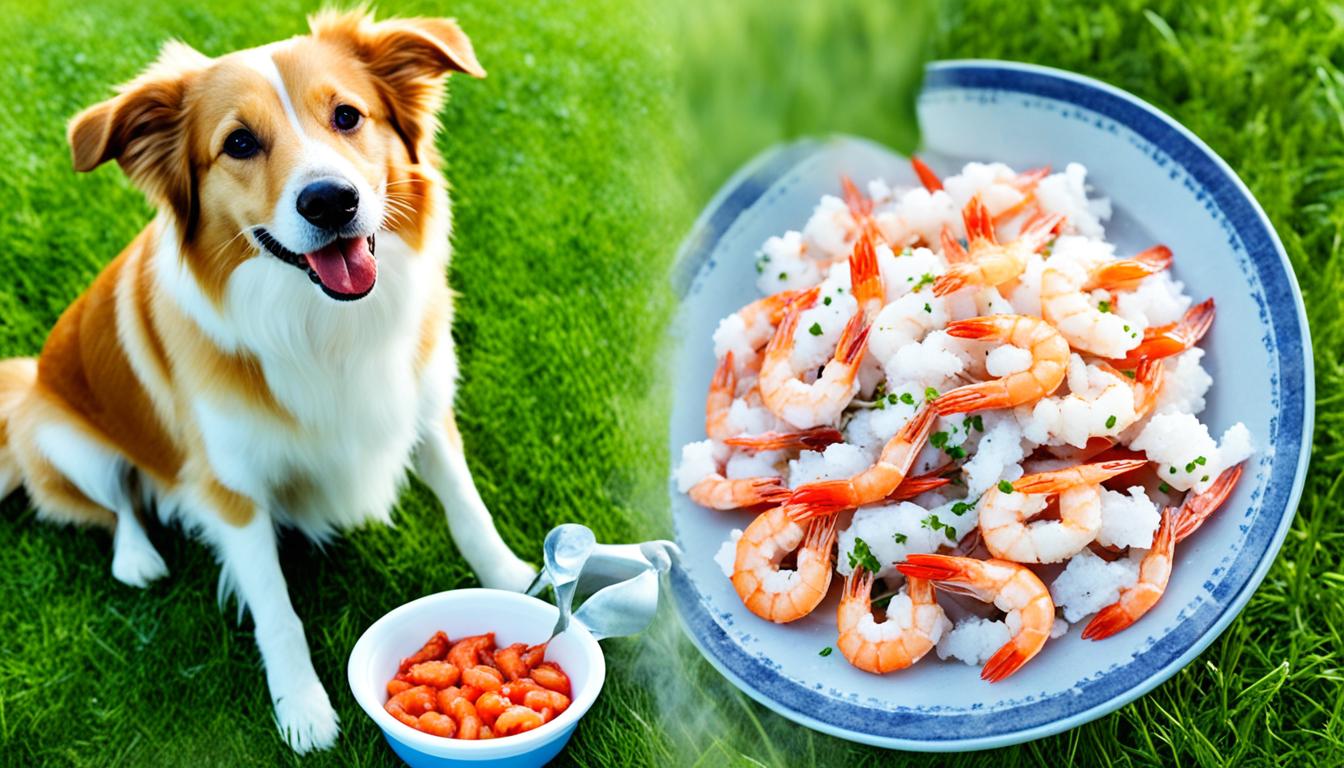As an Amazon Associate I earn from qualifying purchases.
Picture this: a beautiful summer day, the scent of grilled shrimp wafting through the air, and your loyal companion sitting at your feet, eagerly awaiting their share. It’s moments like these that make you wonder, can dogs eat shrimp? After all, you want nothing but the best for your furry friend.
Well, fret not! We have consulted with veterinarians to bring you expert advice on the safety of feeding shrimp to dogs. So, let’s dive into this deliciously exciting topic and find out if shrimp can be a part of your pup’s diet.
Key Takeaways:
- Shrimp can be safely consumed by dogs in moderation.
- They are packed with essential nutrients and are low in fat, calories, and carbohydrates.
- It is important to remove the shell and cook shrimp thoroughly before serving.
- Raw shrimp should never be given to dogs due to potential harmful pathogens.
- Consult with a veterinarian for proper portion control and guidance.
The Risks of Raw Shrimp for Dogs
Raw shrimp may seem like a tempting treat to share with your furry friend, but in reality, it poses significant risks to their health. Raw shrimp can harbor harmful pathogens such as bacteria and parasites, which can lead to foodborne illnesses in dogs. These illnesses often manifest as unpleasant symptoms like diarrhea and vomiting, causing discomfort for your beloved pet.
To ensure your dog’s safety, it is crucial to cook shrimp properly before feeding it to them. Cooking methods such as boiling or steaming help eliminate potential pathogens, making the shrimp safe for consumption. It’s important to note that you should always remove the shell of the shrimp before offering it to your dog to prevent any choking hazards.
Additionally, when preparing shrimp for your pup, avoid seasoning it with any ingredients that may be toxic to dogs. Certain seasonings and spices, such as garlic and onions, can be harmful and should be strictly avoided.
Benefits of Cooking Shrimp for Dogs
- Eliminates harmful pathogens
- Makes shrimp safe for consumption
- Prevents foodborne illnesses
- Reduces the risk of choking hazards
By taking these precautions and cooking shrimp thoroughly, you can ensure your dog enjoys a safe and tasty treat without any adverse effects. Remember, it’s always better to be cautious when introducing new foods into your dog’s diet.
Moderation and Portion Control for Dogs
When it comes to feeding shrimp to dogs, moderation and portion control are essential. Just like with any new food, you want to introduce shrimp gradually and observe how your furry friend reacts. Every dog is unique, so it’s important to pay attention to their individual needs.
As an occasional treat, most dogs can safely enjoy one or two pieces of shrimp. However, it’s crucial to consider the size of your dog, especially for smaller breeds who may be more prone to choking hazards. In such cases, it’s advisable to offer partial pieces of shrimp to ensure their safety.
Doggy Delights: Shrimply Irresistible or Shellfish Challenge?
“Feeding your pup shrimp can be a fun and tasty addition to their diet, but remember to practice moderation and keep a watchful eye on your dog’s reaction.”
If you’re unsure about the suitable portion size for your dog, it’s always wise to consult with a veterinarian or veterinary nutritionist. They can provide you with expert guidance on quantities and address any potential health concerns your dog may have.
By practicing moderation and portion control, you can ensure that feeding shrimp to your dog remains a safe and enjoyable experience. Remember, a little shrimp can go a long way in treating your four-legged companion!
Why Size Matters: Portion Control for Different Breeds
Just like humans, dogs come in all shapes and sizes. Therefore, it’s crucial to consider your dog’s breed and individual dietary requirements when determining portion sizes for shrimp. Take a look at the table below to get an idea of recommended portion sizes for different breeds:
| Breed Size | Recommended Portion Size |
|---|---|
| Small (e.g., Chihuahua, Yorkshire Terrier) | A few small pieces or partial shrimp |
| Medium (e.g., Cocker Spaniel, Border Collie) | One or two medium-sized shrimp |
| Large (e.g., Labrador Retriever, German Shepherd) | One or two large shrimp |
| Giant (e.g., Great Dane, Saint Bernard) | Two or three large shrimp |
Keep in mind that these are general guidelines and may vary depending on the specific nutritional needs and sensitivities of your dog. Always consult with a professional to ensure you’re providing the right portion sizes for your furry friend.
Health Benefits of Shrimp for Dogs
Shrimp can offer some paw-some health benefits for your furry friend. Check out these fin-tastic reasons why adding shrimp to your dog’s diet can be beneficial.
1. Protein Powerhouse
Shrimp are a fantastic source of protein, which is vital for building and repairing your dog’s body tissues. Protein helps support strong muscles, healthy skin, and a shiny coat.
2. Essential Vitamins and Minerals
These little crustaceans are packed with essential vitamins and minerals like vitamin B12, niacin, and phosphorus. These nutrients play a crucial role in supporting various bodily functions, including metabolism, enzyme function, bone health, and brain aging prevention.
3. Antioxidant Boost
Shrimp also contain antioxidants that can help fight off harmful free radicals in your dog’s body. These antioxidants contribute to overall well-being and may help support a healthy immune system.
Eager to learn more about the health benefits of shrimp for dogs? Take a look at the table below for a quick overview:
| Health Benefits of Shrimp for Dogs |
|---|
| Rich source of protein for building and repairing body tissues |
| Vitamins and minerals support metabolism, enzyme function, bone health, and brain aging prevention |
| Contain antioxidants that can help fight off harmful free radicals |
Remember, while shrimp can be a healthy addition to your dog’s diet, it should be given in moderation and as a supplementary treat, not a replacement for a balanced dog food diet. As always, it’s important to consult with your veterinarian before introducing any new foods into your dog’s meal plan.

So, go ahead and indulge your pup with a little seafood delight. Just make sure to cook the shrimp thoroughly, remove the shell, and serve it as an occasional treat to keep their tails wagging and their health in check!
Precautions and Potential Risks of Dogs Eating Shrimp
While shrimp can be a tasty and safe treat for dogs when given in moderation, it’s important to be aware of the potential risks involved. Here are a few precautions to keep in mind:
- Allergy Alert: Some dogs may have allergies to shellfish, including shrimp. If your furry friend experiences symptoms like vomiting, diarrhea, or itching after eating shrimp, they may have an allergic reaction. It’s always best to consult with your veterinarian if you suspect your dog has a food allergy.
- Choking Hazard: Shrimp shells can pose a choking hazard, especially for smaller dog breeds. Ensure that the shrimp is properly cooked and the shells are removed before serving it to your canine companion. This precaution helps prevent any potential choking incidents.
- Intestinal Obstructions: Ingesting shrimp shells can also lead to intestinal obstructions, which can be uncomfortable and dangerous for dogs. This risk is particularly relevant for smaller breeds that may have a harder time digesting and passing the shells. Keep a watchful eye on your dog’s behavior and consult with your veterinarian if you notice any signs of discomfort or digestive issues.
Remember, prevention is key when it comes to keeping your four-legged friend safe. Pay close attention to their reactions, practice responsible portion control, and consult a professional for any concerns or questions you may have.

Alternatives to Shrimp for Dogs
If you are looking for alternative seafood options for your dog, there are several dog-friendly choices available. Here are some delicious alternatives to shrimp that your furry friend will love:
Sardines
Sardines are a fantastic source of protein and essential fatty acids for dogs. They are packed with omega-3 fatty acids, which promote healthy skin, coat, and joint health. Just make sure to choose sardines that are boneless and packed in water or olive oil without any added salt or seasonings. You can serve sardines as a special treat or mix them into your dog’s regular meals.
Cooked Salmon
Salmon is another excellent seafood option for dogs. It is rich in omega-3 fatty acids, high-quality protein, and essential vitamins and minerals. When giving salmon to your dog, ensure that it is cooked thoroughly, boneless, and without any seasoning. Avoid using smoked salmon as it may contain high levels of salt and other preservatives that can be harmful to dogs. Cooked salmon can be served as a standalone treat or added to your dog’s food for an extra nutritional boost.
Green-Lipped Mussels
Green-lipped mussels from New Zealand are not only delicious but also have potential health benefits for dogs. These mussels are known for their anti-inflammatory properties and are particularly beneficial for dogs with arthritis or joint issues. They are typically available in powder or supplement form. Consult with your veterinarian to determine the right dosage and form of green-lipped mussels for your dog.
It is important to introduce these seafood alternatives gradually into your dog’s diet and monitor their reaction. Remember to offer them in moderation to avoid any digestive issues. Choose high-quality sources and consult with your veterinarian for guidance on portion sizes and any specific dietary concerns your dog may have.
Conclusion
So, is shrimp safe for dogs? Absolutely, but with a few important considerations. While shrimp can be a delicious and nutritious addition to your canine companion’s diet, it’s crucial to exercise caution and responsible feeding practices.
Cooked shrimp is safe for dogs to consume in moderation. Make sure to remove the shells, as they can pose a choking hazard. Portion control is also key, as too much shrimp can upset your dog’s stomach. Remember, moderation is the key to a happy and healthy pet!
If you decide to introduce shrimp into your dog’s diet, it’s always best to consult with a veterinarian first. They can provide tailored advice based on your dog’s specific needs and help you navigate any potential risks or allergies. Your vet can guide you on portion sizes, preparation methods, and possible alternatives.
In conclusion, when prepared and offered responsibly, shrimp can be a tasty and nutritious treat for dogs. Just remember to prioritize your dog’s well-being and seek professional advice when in doubt. Happy feeding!
FAQ
Can dogs eat shrimp?
Is shrimp safe for dogs?
Can dogs eat raw shrimp?
How much shrimp can dogs eat?
What are the health benefits of shrimp for dogs?
What are the potential risks of dogs eating shrimp?
What are the alternatives to shrimp for dogs?
Source Links
- https://petcube.com/blog/shrimp/
- https://www.akc.org/expert-advice/nutrition/can-dogs-eat-shrimp/
- https://www.petmd.com/dog/nutrition/can-dogs-eat-shrimp
As an Amazon Associate I earn from qualifying purchases.

